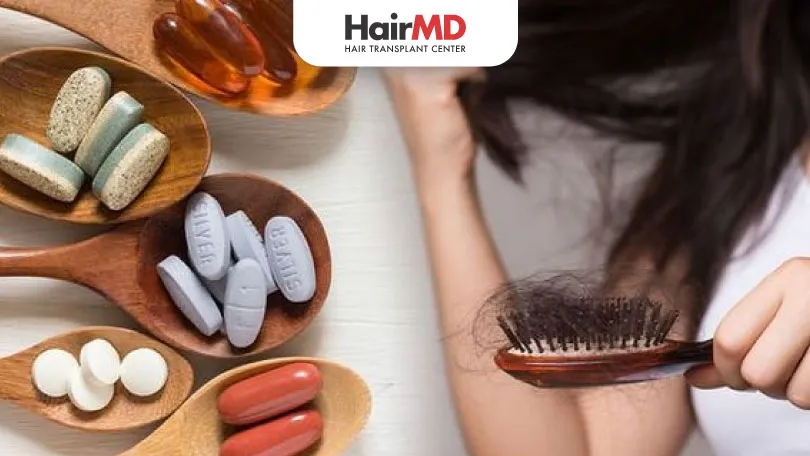19th July, 2024

Hair loss can be distressing, but did you know certain vitamins play a key role in maintaining healthy hair? In this blog, HairMD explores essential vitamins—such as vitamins A, B, C, D, and E—that are critical for hair growth and reducing hair loss. Understanding the impact of each vitamin and ensuring you consume them in balanced amounts can help improve hair health.
For those experiencing significant hair loss, the blog also recommends consulting a dermatologist for personalized advice.
What’s covered in the article?
- Best Vitamin for Hair Loss
- Conclusion
Best Vitamin for Hair Loss
Many people consider healthy-looking hair a sign of overall health and beauty. Hair, like any other part of your body, requires a variety of nutrients to grow healthily.
Many nutritional deficiencies have been linked to hair loss.
While age, genetics, and hormones all have an impact on hair growth, optimal nutrient intake is critical. Let’s find out the best Vitamin for hair loss.
Best Vitamin for Hair Loss
The following are the vitamins for preventing hair loss:
Vitamin A
Vitamin A is required for the growth of all cells, and its deficiency can cause a variety of issues, including hair loss. It also regulates the production of sebum, which helps moisturise the scalp and contributes to the hair’s health.
While getting enough vitamin A is essential, getting too much is not. Too much vitamin A, according to research, can also contribute to hair loss.
Several vegetables, including sweet potatoes, carrots, pumpkins, spinach, and kale, contain beta-carotene, which is converted into vitamin A. Also, animal products containing vitamin A include milk, eggs, and yoghurt. Cod liver oil is an especially good source.
Vitamin B
Biotin, a B complex vitamin, is considered the best Vitamin for hair loss treatment. Human hair loss has been linked to biotin deficiency in various studies. Vitamin B 12 aids in the formation of red blood cells, which transport oxygen and nutrients to the scalp and hair follicles. These are necessary for hair growth.
It can be obtained from a variety of foods, including:
- Whole grains
- Almonds
- Meat
- Fish
- Seafood
- Dark leafy green Vegetables
Furthermore, the only good sources of vitamin B12 are animal foods. Consider taking a supplement recommended by your dermatologist if you eat a vegetarian or vegan diet.
Vitamin C
Damage from free radicals can stifle growth and cause your hair to age. The antioxidant properties of vitamin C aid in preventing oxidative stress caused by free radicals. Furthermore, your body requires vitamin C to produce collagen, a protein that is essential for hair structure. It also aids in the absorption of iron, a mineral vital for hair growth.
Strawberry, pepper, guava, and citrus fruits contain vitamin C. Vitamin C is considered the best Vitamin for hair loss.
Vitamin D
Low vitamin D levels have been linked to alopecia, a technical term for hair loss. Low vitamin D levels have been linked to causing various other forms of hair loss, including telogen effluvium and patterned hair loss.
Direct contact with the sun’s rays causes your body to produce vitamin D. Vitamin D is found in various foods, including fatty fish, cod liver oil, and mushrooms. So increasing the intake of this vitamin may be a good idea. Contact your dermatologist to know the amount of Vitamin D intake for hair growth.
Vitamin E
As it has a natural antioxidant that assists in maintaining hair growth, vitamin E is one of the best Vitamins for hair loss. Its antioxidant properties help reduce oxidative stress levels and free radicals that can cause hair follicles to break down. Also, it helps prevent premature greying of hair.
Vitamin E can be taken in the form of food, as well. Below are some food that contains Vitamin E –
- Wheat Germ Oil
- Sunflower, Safflower oil
- Almonds
- Red Bell Pepper
- Pumpkins
- Peanuts
- Beet Greens, Spinach and other green leafy vegetables
Now that we know which Vitamin for hair loss helps to keep our hair healthy and strong, add any supplements mentioned above to your daily diet, and see the changes yourself.
For any severe hair loss-related problems, consult the HairMD dermatologists for a timely solution.
Do You Know?
Nearly 250 Patients Visit HairMD
Everyday For Various Hair Concerns?
(Your journey to healthier and fuller hair starts here!)
Meet Our Dermatologists
Conclusion
In conclusion, maintaining a healthy intake of vitamins is crucial for promoting hair growth and preventing hair loss. Vitamins like A, B-complex (particularly biotin), C, D, and E each play specific roles in strengthening hair follicles, improving scalp circulation, and supporting overall hair health. However, it’s essential to approach hair loss holistically, combining a balanced diet with medical guidance. For persistent or severe hair loss, consulting a dermatologist remains the best course of action.
Further Reading
Top Kitchen Ingredients to Boost Hair Growth
Discover the best kitchen ingredients for hair growth! Use coconut oil, onion juice, aloe vera & more to nourish your hair naturally and reduce hair fall.
How to use Minoxidil and Dermaroller together?
Boost hair growth with Minoxidil & Dermaroller! Learn the right technique, benefits, and mistakes to avoid for thicker, healthier hair.
Powerful Home Remedies for Itchy Scalp
Soothe an itchy scalp naturally with home remedies like aloe vera, coconut oil, and apple cider vinegar. Discover simple solutions for scalp relief.
Omega-3 for Hair Growth: Benefits and Side Effects
Omega-3 nourishes hair, promotes growth, and reduces hair fall. Know its benefits, side effects, and best sources for healthy, stronger hair.
Have thoughts? Please let us know
We are committed not only to treating you, but also educating you.











